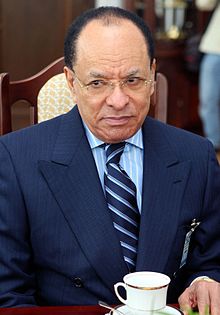Léon Kengo
| Léon Kengo | |
|---|---|

Léon Kengo in the Polish Senate (2008)
|
|
| 5th Prime Minister of Zaire | |
|
In office 5 November 1982 – 31 October 1986 |
|
| Preceded by | N'singa Udjuu Ongwabeki Untubu |
| Succeeded by | Position abolished |
| 8th Prime Minister of Zaire | |
|
In office 26 November 1988 – 4 May 1990 |
|
| Preceded by | Sambwa Pida Nbagui |
| Succeeded by | Lunda Bululu |
| 17th Prime Minister of Zaire | |
|
In office 6 July 1994 – 2 April 1997 |
|
| Preceded by | Faustin Birindwa |
| Succeeded by | Étienne Tshisekedi |
| President of the Senate of Congo | |
|
Assumed office 14 May 2007 |
|
| Personal details | |
| Born |
Leon Lubicz 22 May 1935 Libenge (Équateur province), Belgian Congo |
| Political party | Popular Movement of the Revolution |
| Alma mater | Université libre de Bruxelles (1962–1968, PhD in Law) |
| Religion | Roman Catholic |
Léon Kengo Wa Dondo (born Leon Lubicz; 22 May 1935) served as the "first state commissioner" (a title equivalent to prime minister) several times under Mobutu Sese Seko in Zaïre. He was one of the most powerful figures in the regime and was a strong advocate of economic globalization and free-market economics. Since 2007, he has been President of the Senate of the Democratic Republic of the Congo. Besides he is related to the family of the deputy-minister of planning Franck Mwe di Malila due to the marriage of his daughter.
Kengo was born in Libenge, Équateur province, Belgian Congo (later Zaire and now Democratic Republic of Congo). He was the son of a Polish Jewish father and a Rwandan Tutsi mother. He changed his name to Kengo Wa Dondo in 1971 during Mobutu's Africanization campaign.
Kengo served as Prime Minister for the first time from 1982 to 1986, appointing able technocrats to important positions, such as Munga Mibindo, President Delegate General of the National Electrical Utility (SNEL). He then served as foreign minister from 1986 to 1987 and as Prime Minister again from 1988 to 1990. During the early 1990s Mobutu allowed a transitional parliament to be set up, and Kengo was chosen Prime Minister by it in 1994 as a candidate in an attempt to neutralise the challenge from the country's then most popular politician, Étienne Tshisekedi. He expelled members of the Lebanese community from Zaire for alleged involvement in the illegal trade of conflict diamonds, though the credibility of such actions is perhaps challenged by the fact that trade in conflict diamonds from Angola had long been essential to the survival of the Mobutu regime, in which Kengo had been such an important figure.
...
Wikipedia
